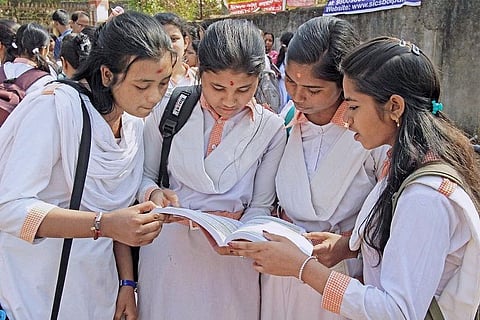

Close to four months after the State Council for Educational Research and Training (SCERT) began the process of updating curriculum for state-board schools, the Tamil Nadu government has released a draft syllabus. It covers a revised curriculum for classes 1-12 and this upgradation comes 12 years after the last change in syllabus.
Chief Minister Edappadi Palaniswami and Education Minister Sengottaiyan released the revised syllabus on Monday. The decade-old curriculum and the government's failure to update it had been cited as one of the main reasons for the poor performance of state board students in the all-India medical entrance test NEET. In July, the state government held a conference to discuss the framework of the new syllabus.
The Tamil Nadu Curriculum Framework Committee headed by former Vice Chancellor of Anna University M Anandakrishnan held public hearings at several places including Chennai and Madurai to hear out suggestions from stakeholders.
"We have included subjects based on the advancement in sciences," says G Arivoli, the Director of SCERT. "This includes robotics, nano science and newer aspects on the syllabus. Our aim is to ensure that the textbook that finally reaches the hands of the student is their biggest learning tool. Charting a syllabus is not difficult but what matters is that we have a lot of application-oriented activities in the learning process," he adds.
When asked if teachers will be trained to handle classes based on the new syllabus, he says, "We are currently discussing how to train teachers and what kind of workshop we have to conduct. But in the meantime, we are preparing a guidebook for teachers for the first time in Tamil Nadu. This will tell them how to instruct students," he adds.
The syllabus will be put on the government website by midnight on Monday. "For the next fifteen days, we welcome any suggestions from the public," says the Director. The new syllabus is expected to come out in January.
Meanwhile, parents and experts who have been communicating with authorities welcome the new syllabus but remind the government that the method of examination too requires change.
"The syllabus has finally changed after 12 years of struggle," says Nandhakumar, a member of the Parent-Teacher Association for Matriculation Schools in Chennai. "It is also important for revised portions to be on par with CBSE. That we will know by Tuesday morning and if it is not we will continue to fight for change," he adds.
Educationalists also point out gaps in the manner in which the state government is approaching the matter.
"It sounds good on paper to introduce subjects like robotics or nano technology. But do they have the funding required for the lab facilities? Can their teachers instruct students on these subjects?" asks educationalist Jayaprakash Gandhi. "Instead of trying to include additional subjects, they should ensure students are given the knowledge to tackle competitive exams," he adds.
For this, the system of giving them a blueprint of the examination paper has to be abolished says the expert. "Exams should have question papers where at least 50% of the answers are application based," he explains.
For the state government, the change in syllabus is a major political matter. This, especially after the death of Anitha, a 17-year-old medical aspirant from Ariyalur in September. The state was blamed for her alleged suicide and questioned for its inability to prepare students for competitive exams.